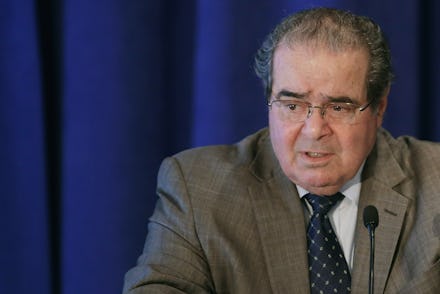Here's Justice Scalia on America's Hot Button Topics — In His Own Words

Supreme Court Justice Antonin Scalia died Saturday at a Texas ranch, ending a 29-year career as one of the court's leading conservative voices.
Writing for the New Republic in 2011, Judge Richard A. Posner called Scalia "the most influential justice of the last quarter century." Scalia had a well-earned reputation for his no-holds-barred style, and provided some of the court's most memorable dissents on the most hot-button issues of the past three decades.
On ruling on America's most controversial issues:
The death penalty? Give me a break. It's easy. Abortion? Absolutely easy. Nobody ever thought the Constitution prevented restrictions on abortion. Homosexual sodomy? Come on. For 200 years, it was criminal in every state.
On criminalizing homosexual sex:
Many Americans do not want persons who openly engage in homosexual conduct as partners in their business, as scoutmasters for their children, as teachers in their children's schools, or as boarders in their home. They view this as protecting themselves and their families from a lifestyle that they believe to be immoral and destructive.
On the Bush v. Gore presidential recount:
Well, I guess the one that created the most waves of disagreement was Bush v. Gore. That comes up all the time, and my usual response is 'get over it.'
Abortion:
The States may, if they wish, permit abortion on demand, but the Constitution does not require them to do so. The permissibility of abortion, and the limitations upon it, are to be resolved like most important questions in our democracy: by citizens trying to persuade one another and then voting.
Obamacare:
The Act that Congress passed makes tax credits available only on "an Exchange established by the State." This Court, however, concludes that this limitation would prevent the rest of the Act from working as well as hoped. So it rewrites the law to make tax credits available everywhere. We should start calling this law SCOTUScare.
Marriage Equality:
'The nature of marriage is that, through its enduring bond, two persons together can find other freedoms, such as expression, intimacy, and spirituality.' Really? Who ever thought that intimacy and spirituality [whatever that means] were freedoms? And if intimacy is, one would think Freedom of Intimacy is abridged rather than expanded by marriage. Ask the nearest hippie.
Affirmative Action:
To pursue the concept of racial entitlement—even for the most admirable and benign of purposes—is to reinforce and preserve for future mischief the way of thinking that produced race slavery, race privilege and race hatred. In the eyes of government, we are just one race here. It is American.
Whether it was the Bush v. Gore case in 2000 that determined the U.S. presidency or recent decisions on marriage equality and Obamacare, Scalia is remembered for how he served on the Court and fired up a major part of the country's electorate.